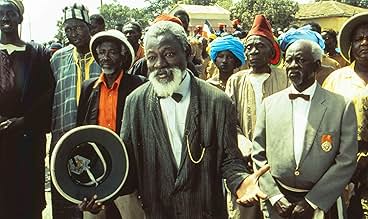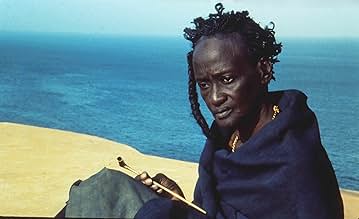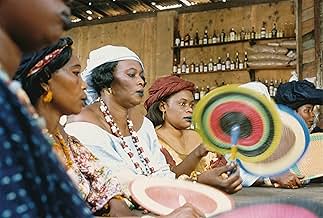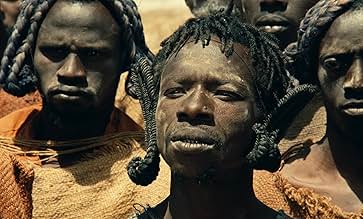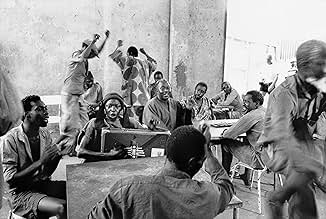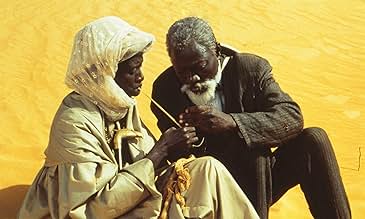IMDb RATING
7.4/10
1.4K
YOUR RATING
Dramaan is the most popular man in Colobane, but when a woman from his past, now exorbitantly wealthy, returns to the town, things begin to change.Dramaan is the most popular man in Colobane, but when a woman from his past, now exorbitantly wealthy, returns to the town, things begin to change.Dramaan is the most popular man in Colobane, but when a woman from his past, now exorbitantly wealthy, returns to the town, things begin to change.
- Awards
- 1 win & 1 nomination
Omar Ba
- Le chef du protocole
- (as Omar Ba dit 'Baye Peul')
Issa Samb
- Le Professeur
- (as Issa Ramagelissa Samb)
Rama Thiaw
- La femme du Maire
- (as Rama Tiaw)
Abdoulaye Diop
- Le Médecin
- (as Abdoulaye Yama Diop)
Oumi Samb
- La danseuse
- (as Oumy Samb)
Tcheley Hanny
- Amazone
- (as Hanny Tchelley)
- Director
- Writers
- All cast & crew
- Production, box office & more at IMDbPro
Storyline
Did you know
- TriviaRestored over the course of 2017 by Eclair Digital in Vanves, France. The restoration was taken on by Thelma Film AG.
- ConnectionsFeatured in The Story of Film: An Odyssey: Movies to Change the World (2011)
Featured review
Djibril Diop Mambéty's Hyenas doesn't quite jump the shark to the extent of Eugène Ionesco's Rhinoceros, a corrosive social satire which dramatizes the macro and micro fallibility of humankind by having people literally transform into the titular safari animal... but so searingly incisive is Mambéty's critique that you get the sense he's at least toyed with the idea. Adapting Swiss-German satirist Friedrich Dürrenmatt's play The Visit, Mambéty ups the stakes of the text's Sophie's choice scenario (is one man's life worth untold millions for a town fallen into ruin?) by setting it in rural Senegal, wherein the collective battle of moralism and pride against a paradigm shift of wealth is amplified to poignant and sobering heights. As such, Hyenas serves to both savagely lambast the corrosive legacy of colonialism in a recently independent Senegal, while equally shedding the spotlight of judgment on the role of virtue in a capitalist society - an experience which generally proves equally squirmy for the average viewer, as for the characters onscreen. Hyenas is billed as a dark comedy, but, apart from trace elements of allegorical magic realism (we never find out exactly how an exiled, former teenage prostitute has become "richer than the world's bank"), there's only the bleakest, most mirthless of incredulous guffaws to be found therein. Instead, Mambéty wrings out every last drop of uncomfortable empathy in depicting a poor but proud people steadily succumbing to materialistic, murderous mob mentality* - a scenario that starts absurd, but quickly becomes far too familiar. Mambéty's witty screenplay deftly unspools each wrinkle of collective corruption, from the nattily dressed mayor bemoaning the degraded state of his town, oblivious to the rag-wearing homeless man bemusedly building a fire immediately behind him, to the townspeople vocally expressing their outrage ("She thinks we're Americans who would kill each other for nothing!") while blatantly strutting around wearing their bribes, practically collectively willing the murder into a fatalistic eventuality. As the situation escalates, Mambéty lets the poignancy of the joke fester. Things may start with comparative levity, (Mambéty turns each townsperson lobbying for new refrigerators and air conditioners into a sordid, Oprah-esque gameshow), but it isn't long before the initial paradoxical joviality decays into a literal torch-bearing mob (the town gaslighting their 'walking dead' peer by barring him entrance to a train leaving town while wishing him a good trip is genuinely hard to watch), before culminating in a dirge of chanting, shuffling zombies. Though Hyenas is, for the most part, a slow, sombre, methodical film, Mambéty lends it a larger-than-life aesthetic grandeur. His cinematography employs a high saturation rate, with the vibrancy of colours (glaring, aggressive reds, and the encroaching, corrupting sheen of gold) popping against the beige of (gorgeously shot) sweeping expanses of desert perfectly encapsulating the intoxicating allure of colonial socioeconomic transformation. Similarly, Wasis Diop's moody guitar score lends a thoughtful, eulogistic dignity to the slow, fatalistic social decay at play. While some of Mambéty's visual metaphors are a touch hit-and-miss (while having the townspeople slowly adapt hairstyles recalling hangman's nooses is a slick piece of visual trickery, his Modern Times-esq consistent cross-cutting between brewing mobs and a pack of snarling hyenas is a bit too on-the-nose), the consistent framing device of herds of local animals stirring uneasily (including a poor captive monkey at the film's central hub, who ends up becoming a disapproving Greek chorus unto itself) does lend the film an effectively disquieting restlessness. And as for the perplexing, sneaky ambiguity of the film's final shot? Mambéty is content to let the viewer stew, and draw their own conclusions. As the formerly "most popular man in Colobane" turned 'most likely to be assassinated,' Mansour Diouf anchors the film with an immaculately balanced performance that shifts from irreverent goofiness, to exasperated histrionics, before finishing with a quieter, sadder dignity. He carefully toes the line of remaining sympathetic without ever becoming too likeable throughout, instead wearing his flawed humanity on his sleeve with a gentle, sad, side-smile. As the imposingly wealthy homecoming Linguère Ramatou, Ami Diakhate steals the show with a formidable, commanding presence. In less capable hands, Ramatou, with her devious master plan and golden artificial limbs, would play like a Bond villain - but Diakhate ensures that Ramatou's vitriol is grounded in a lifetime of real, radiating hurt, which Diakhate rawly embodies with consummate class. Faly Gueye consistently steals scenes with an icy deadpan humour as Diouf's perennially unimpressed wife, while Mahourédia Gueye pompously postures like the best of them as the town's blustery mayor.
Fuelled with the timeless wisdom of a Classical Greek tragedy, yet coursing with the contemporary, acrid urgency of an itching postcolonial critique, Mambéty's Hyenas is a stirring, vibrant, and grimly entrancing watch. Although one can't help but with that Mambéty had dialled back the somewhat overblown visual symbolism a tad, and instead redirected that energy into a shade more of the tension-breaking humour just aching to surface, his film remains an unflinchingly striking watch. A cornerstone of contemporary African cinema, Hyenas is a timeless snarl at the overbearing fatalism of colonialism and capitalism - and, over 25 years on, it hasn't lost a whit of potency or relevance.
-8.5/10
*How's THAT for alliteration?
Fuelled with the timeless wisdom of a Classical Greek tragedy, yet coursing with the contemporary, acrid urgency of an itching postcolonial critique, Mambéty's Hyenas is a stirring, vibrant, and grimly entrancing watch. Although one can't help but with that Mambéty had dialled back the somewhat overblown visual symbolism a tad, and instead redirected that energy into a shade more of the tension-breaking humour just aching to surface, his film remains an unflinchingly striking watch. A cornerstone of contemporary African cinema, Hyenas is a timeless snarl at the overbearing fatalism of colonialism and capitalism - and, over 25 years on, it hasn't lost a whit of potency or relevance.
-8.5/10
*How's THAT for alliteration?
- How long is Hyenas?Powered by Alexa
Details
- Release date
- Countries of origin
- Official sites
- Languages
- Also known as
- Hyènes
- Filming locations
- Production companies
- See more company credits at IMDbPro
Box office
- Gross US & Canada
- $24,672
- Gross worldwide
- $24,672
Contribute to this page
Suggest an edit or add missing content



